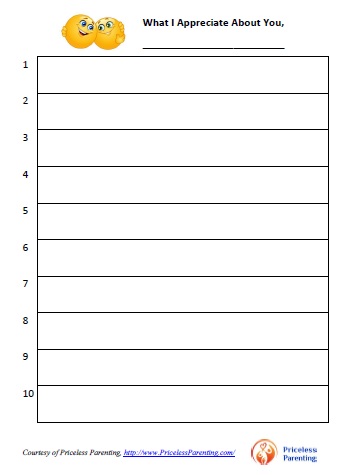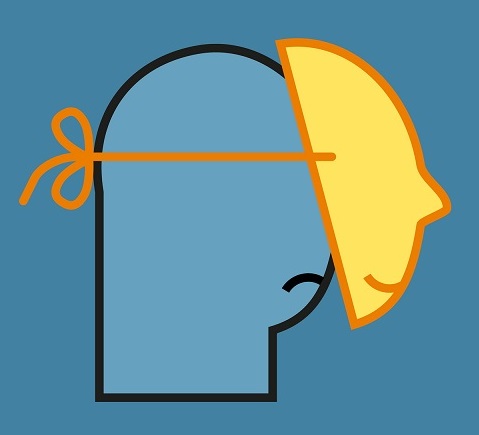What four things matter the most in parenting? Might they be the same as the four things that matter most in life? It’s likely since your relationships with your children are among the most significant ones in your life.
The Four Things That Matter Most
Dr. Ira Byock, an international leader in palliative care, has witnessed many people’s final days. He’s captured the valuable things he’s learned from the dying in his book, The Four Things That Matter Most: A Book About Living.
Byock noticed many who are dying have a strong desire to repair relationship rifts with their loved ones. Repairing their relationships allows them to die in a more peaceful state. He learned that these four statements were the crucial ones to communicate:
(finish reading at PricelessParenting.com)
Evaluating Risks and Heeding Warnings
Taking risks is part of living. Your kids need to be able to take reasonable risks to learn and grow. For example, your children would never learn to walk if they weren’t able to risk falling.
Since you can’t keep your kids in some sort of safety bubble, what can you do to help prevent them from being hurt? You can help them think through likely consequences of their choices.
By forewarning your kids, you prepare them. When they are young, you warn them about everything from not touching a hot stove to never getting in a car with a stranger. When they are older you warn them about not drinking and driving. You love them and are trying to protect them from danger. However, it’s up to them to decide if they will heed your warnings.
Giving Warnings
Your kids will sometimes ignore your warnings and learn from the results. They might not hold on tightly to their helium balloon and it sails away. Perhaps they decide to play video games instead of study for a test and get a poor grade. These are natural consequences of their choices. They learn from experiencing these consequences … although some kids will need lots of examples!
How about when the consequences are bigger? Regular conversations involving true stories can help. Your local newspaper is an excellent source of stories about kids facing serious consequences.
(finish reading at PricelessParenting.com)
Since you can’t keep your kids in some sort of safety bubble, what can you do to help prevent them from being hurt? You can help them think through likely consequences of their choices.
By forewarning your kids, you prepare them. When they are young, you warn them about everything from not touching a hot stove to never getting in a car with a stranger. When they are older you warn them about not drinking and driving. You love them and are trying to protect them from danger. However, it’s up to them to decide if they will heed your warnings.
Giving Warnings
Your kids will sometimes ignore your warnings and learn from the results. They might not hold on tightly to their helium balloon and it sails away. Perhaps they decide to play video games instead of study for a test and get a poor grade. These are natural consequences of their choices. They learn from experiencing these consequences … although some kids will need lots of examples!
How about when the consequences are bigger? Regular conversations involving true stories can help. Your local newspaper is an excellent source of stories about kids facing serious consequences.
(finish reading at PricelessParenting.com)
Fueling Good Versus Evil
Everyone is capable of both good and evil behavior. Even when doing something bad or evil, people often justify their behavior with some supposedly good reason. This allows them to maintain their good self-image.
There are many stories of someone committing murder who you’d least expect to do this. When the news reporters interview the neighbors or family members, they express shock and bewilderment. They did not believe this person was capable of murdering. Time and time again there is dismay when good people do evil things.
Acknowledging the Potential for Good and Evil
Everyone is capable of incredibly loving behavior and devastatingly cruel behavior. How do you teach your children about tipping the scale towards good rather than evil?
(Finish reading this article on PricelessParenting.com)
There are many stories of someone committing murder who you’d least expect to do this. When the news reporters interview the neighbors or family members, they express shock and bewilderment. They did not believe this person was capable of murdering. Time and time again there is dismay when good people do evil things.
Acknowledging the Potential for Good and Evil
Everyone is capable of incredibly loving behavior and devastatingly cruel behavior. How do you teach your children about tipping the scale towards good rather than evil?
(Finish reading this article on PricelessParenting.com)
Teaching Kids Heartfelt Apologies
Do you remember hearing someone give an inauthentic apology? Perhaps it was the tone of their voice or the fact they tried to shift the blame to someone else. This type of apology makes the situation worse, not better.
Heartfelt apologies express true regret along with a desire to make amends. Authentic apologies strengthen relationships and build trust. Learning how to give heartfelt apologies is an important skill for your kids to develop.
Learning to Make Amends for Mistakes
What do you do when your child’s behavior causes another child to become upset? Many young children find themselves in this situation after grabbing a toy away from another child. Do you intervene by handing the toy back to the child who had it first? Do you tell your child “Say you are sorry”?
These are your child’s earliest lessons in how to make amends for mistakes. If you force your child to say “I’m sorry” when they really are not sorry, you are teaching them how to suppress their true feelings and lie.
(finish reading the article on PricelessParenting.com)
Heartfelt apologies express true regret along with a desire to make amends. Authentic apologies strengthen relationships and build trust. Learning how to give heartfelt apologies is an important skill for your kids to develop.
Learning to Make Amends for Mistakes
What do you do when your child’s behavior causes another child to become upset? Many young children find themselves in this situation after grabbing a toy away from another child. Do you intervene by handing the toy back to the child who had it first? Do you tell your child “Say you are sorry”?
These are your child’s earliest lessons in how to make amends for mistakes. If you force your child to say “I’m sorry” when they really are not sorry, you are teaching them how to suppress their true feelings and lie.
(finish reading the article on PricelessParenting.com)
Developing Habits to Succeed in School
Can developing good habits help your kids succeed in school? Yes! Habits are powerful patterns of behavior that automatically unfold in certain situations. By establishing helpful habits, your kids will have routines that support them succeeding in school.
The brain loves to establish habits because it takes less thinking and energy. For example, when your children are learning something like how to tie their shoes or drive a car, it will take all their focus to accomplish the task. Once they master it, their brains will use far less energy as the process becomes automatic.
The problem is that your child's brain is just as happy to establish healthy habits as unhealthy ones. Establishing the habit of either having cookies for snack or vegetables with dip is equally appealing to your child's brain. Given how powerful habits are, it is worth figuring out which ones will help your kids succeed in school.
(finish reading article on PricelessParenting.com)
The brain loves to establish habits because it takes less thinking and energy. For example, when your children are learning something like how to tie their shoes or drive a car, it will take all their focus to accomplish the task. Once they master it, their brains will use far less energy as the process becomes automatic.
The problem is that your child's brain is just as happy to establish healthy habits as unhealthy ones. Establishing the habit of either having cookies for snack or vegetables with dip is equally appealing to your child's brain. Given how powerful habits are, it is worth figuring out which ones will help your kids succeed in school.
(finish reading article on PricelessParenting.com)
Avoiding Parenting Burnout By Choosing How To Wisely Spend Your Energy
How is your energy level right now? Are you feeling depleted or do you feel like you have plenty of energy? Do you live most days full speed ahead or do you have room to breathe?
Many parents live their days feeling crazy busy. While some days are certainly going to be packed full, being that busy all the time is a recipe for problems.
Hitting The Energy Wall
Brenda was working full time teaching at a college plus raising her two young children with her husband. Her office walls were filled with various awards documenting her many achievements. She strove to be an excellent teacher, mother and wife. She was too busy to question how she was spending her time. There was just so much to do!
One day she ended up in the emergency room because of heart attack symptoms.
(finish reading the article on PricelessParenting.com)
Many parents live their days feeling crazy busy. While some days are certainly going to be packed full, being that busy all the time is a recipe for problems.
Hitting The Energy Wall
Brenda was working full time teaching at a college plus raising her two young children with her husband. Her office walls were filled with various awards documenting her many achievements. She strove to be an excellent teacher, mother and wife. She was too busy to question how she was spending her time. There was just so much to do!
One day she ended up in the emergency room because of heart attack symptoms.
(finish reading the article on PricelessParenting.com)
Experiencing and Processing Difficult Emotions
What are you teaching your kids to do when they experience difficult emotions? How do you respond when they are scared, anxious or overwhelmed?
Your response teaches them how to handle their difficult emotions. Some kids learn that certain emotions like fear, anger or jealousy are unacceptable. Instead of expressing these emotions and letting them go, they learn to push these emotions down and put on a happy mask.
Unfortunately, emotions that aren’t expressed don’t magically disappear. These suppressed emotions hang out in the recesses of your mind waiting for an opportunity to be released.
Disregarding Difficult Emotions
Emotions arise from thoughts about situations. The thoughts may happen so quickly or unconsciously that they aren’t easy to notice.
(finish reading this article on PricelessParenting.com)
Your response teaches them how to handle their difficult emotions. Some kids learn that certain emotions like fear, anger or jealousy are unacceptable. Instead of expressing these emotions and letting them go, they learn to push these emotions down and put on a happy mask.
Unfortunately, emotions that aren’t expressed don’t magically disappear. These suppressed emotions hang out in the recesses of your mind waiting for an opportunity to be released.
Disregarding Difficult Emotions
Emotions arise from thoughts about situations. The thoughts may happen so quickly or unconsciously that they aren’t easy to notice.
(finish reading this article on PricelessParenting.com)
Guiding Kids Through Experiences of Loss
Part of growing up is experiencing loss. As much as you love your kids and hate seeing them in pain, you cannot protect them from all harm. The good news is that being human means they are equipped for resilience. They will fall down and they will pick themselves back up.
Your job is to be there for them through their pain … not to prevent the experiences from ever happening. They can and will survive many painful situations. Their losses will fuel some of their most powerful growth and learning.
Experiencing Little and Big Losses
(continue reading this article on PricelessParenting.com)
Your job is to be there for them through their pain … not to prevent the experiences from ever happening. They can and will survive many painful situations. Their losses will fuel some of their most powerful growth and learning.
Experiencing Little and Big Losses
(continue reading this article on PricelessParenting.com)
Improving Your Family Through New Parenting Intentions
Have you made new year’s resolutions? Do you remember one of your resolutions and how it went? People often start out a new year by making resolutions for how they are going to behave differently.
Some people decide to get in better shape. Gym memberships spike in January and participation declines by February. How does it feel if you do not stick to your resolution? Resolutions have judgement built into them. You either pass or fail.
The title of this article specifically uses the word intentions instead of resolutions. Intentions come from your heart. Resolutions come from your head. Setting an intention does not mean you will never fail. It means that when you fail, you will cut yourself some slack for being human. You won’t abandon your intention because you didn’t do it perfectly.
Setting Your New Parenting Intention
What is one thing you’d like to change to improve your family? Any intention that improves your physical, mental, emotional or spiritual wellbeing will benefit your family. Focusing on one priority will increase the likelihood of achieving it.
(continue reading article on PricelessParenting.com)
Some people decide to get in better shape. Gym memberships spike in January and participation declines by February. How does it feel if you do not stick to your resolution? Resolutions have judgement built into them. You either pass or fail.
The title of this article specifically uses the word intentions instead of resolutions. Intentions come from your heart. Resolutions come from your head. Setting an intention does not mean you will never fail. It means that when you fail, you will cut yourself some slack for being human. You won’t abandon your intention because you didn’t do it perfectly.
Setting Your New Parenting Intention
What is one thing you’d like to change to improve your family? Any intention that improves your physical, mental, emotional or spiritual wellbeing will benefit your family. Focusing on one priority will increase the likelihood of achieving it.
(continue reading article on PricelessParenting.com)
Subscribe to:
Comments (Atom)
Are your kids being targeted for sextortion?
Scammers are targeting kids for sextortion. They convince kids that nude pictures of them will be distributed to family, friends, classmate...

-
Susán Hoemke dreamt of a perfect family - a loving husband and four beautiful children. When their oldest son, Hayden, became addicted...
-
Is your teen presenting extremely challenging behavior? If you feel overwhelmed and unsure of how to help your teen, getting professional h...
-
Scammers are targeting kids for sextortion. They convince kids that nude pictures of them will be distributed to family, friends, classmate...








